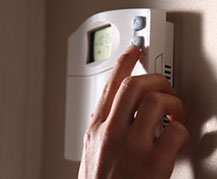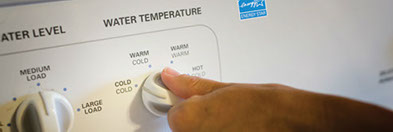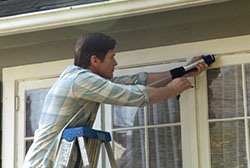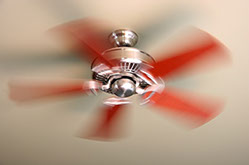


SEARCH MyCVEC
Save Energy Tips
You may not be able to control the outside temps, but it’s never too late to work on your inside environment, at home and work.
All-of-the-time tips
 Have your HVAC system serviced by a professional.
Have your HVAC system serviced by a professional.- Inspect your ductwork and repair leaks or disconnections.
- Set your thermostat to the lowest comfortable temp in the winter (68° F suggested).
- Be sure your HVAC air vents (inflow and out) are clean and not blocked by furniture objects.
- Replace HVAC air filters once a month.
- Install CFL, halogen, or light-emitting diode (LED) light bulbs in the most-used fixtures. LED bulbs use less energy, last longer and give off less heat.
- Lower the thermostat on your water heater to 120° F.
- Wash only full loads of dishes and avoid the dishwasher’s drying cycle.
- Wash full loads of clothes in cold water whenever possible.

- Air dry your clothes. If you use a dryer, check the vent for any blockages.
- Check refrigerator, freezer, and oven doors seals for leaks.
- Full refrigerators and freezers don't have to work as hard to stay cool. If not full of food, use jugs of water to keep your fridge full and cool.
- Your refrigerator can be set between 36 and 38 degrees (F), while your freezer can be set anywere between 0 and five degrees (F).
- Pull your fridge away from the wall and clean the coils. When clean, the refrigerator cycles on and off less, saving you money.
- Consider getting rid of that extra old refrigerator in the garage. If you aren't really using it, it can cost you a few dollars every month to cool a few cans of soda!
- Power down your computer and monitor.
- Use power strips for your home electronics and turn the power strips off when the equipment is not in use. Many home electronics use energy even when in standby mode.

- Caulking and weather striping windows and doors can stop the largest cause of heat loss.
- Insulate your attic and any unheated crawl spaces beneath your house.
- In Virginia, attics should have R38-R60 level of insulation, floors R24-R30. (energystar.gov)
- One bathroom exhaust fans can drain all of the heated air from your home in about an hour!
![]()
Causes of Bill Variations
Conditions Beyond Your Control
- Weather extremes
- Daylight savings time
- Number of days between meter readings
- Guests and entertaining
- Therapeutics and special diets
- Repairs and renovations
- Average age and size of family
- Vacations
- Loss of shade-casting trees
Conditions You Can Control
- New and larger appliances installed (Always choose ENERGY STAR qualified!)
- Excessive house heating or cooling
- Use of older or defective appliances
- Lack of maintenance, such as clogged air filters in furnace
- Leaking of hot water faucets
- Frost on refrigerator unit or shortage of refrigerant
- Excessive use of hot water
- Lack of weatherstripping or insulation
- Moved to a larger home or apartment
- Insufficient insulation window treatments
![]()
When it's COLD outside
 Turning off your central heat system and using space heaters does not save money.
Turning off your central heat system and using space heaters does not save money.- Reverse the direction of your ceiling fans so air bounces off the ceiling, then comes down into the living space. This also eliminates downward breezes that might chill.
- Be sure your chimney flues are closed when not in use.
- Open window treatment on sunny days and close it on cold nights.
- Humidity feels warmer. Using a humidifier allows you to turn down your thermostat.
![]()
 When the weather outside is HOT:
When the weather outside is HOT:
- Set your thermostat as high as comfortably possible in the summer. The less difference between the indoor and outdoor temperatures, the lower your overall cooling bill will be (75° F suggested).
- During the months of the year when it cools off at night, turn off your cooling system and open your windows. In the morning, shut the windows to capture the cool air.
- Close window treatments against the heat of the sun.
- On hot days, avoid using the oven; cook on the stovetop, in a microwave, or on an grill outside.
- Install efficient lighting that runs cooler. Only about 10-15% of the electricity consumed by incandescents results in light - the rest becomes heat. Learn about efficient lighting here.
- Minimize activities that generate a lot of heat, such as running a computer, burning open flames, running a dishwasher, and using hot devices such as curling irons or hair dryers. Even stereos and televisions will add some heat to your home.
Ceiling Fans:
- If you use air conditioning, a ceiling fan will allow you to raise the thermostat setting about 4°F with no reduction in comfort.
 In summer, be sure your ceiling fans blow down and create a breeze in the living space.
In summer, be sure your ceiling fans blow down and create a breeze in the living space.- Turn off ceiling fans when you leave the room. Remember that fans cool people by creating a wind chill effect. They don't cool rooms!
HOME | REPORT AN OUTAGE | PAY MY BILL | CONTACT CVEC
Phone: 434.263.8336 | Toll free: 800.367.2832 | Fax: 434.263.8339
Corporate Headquarters:
800 Cooperative Way
Arrington, VA 22922
Payments:
Dept. 1340 | PO Box 2153
Birmingham, AL 35287-1340
Correspondence:
P. O. Box 247
Lovingston, VA 22949

